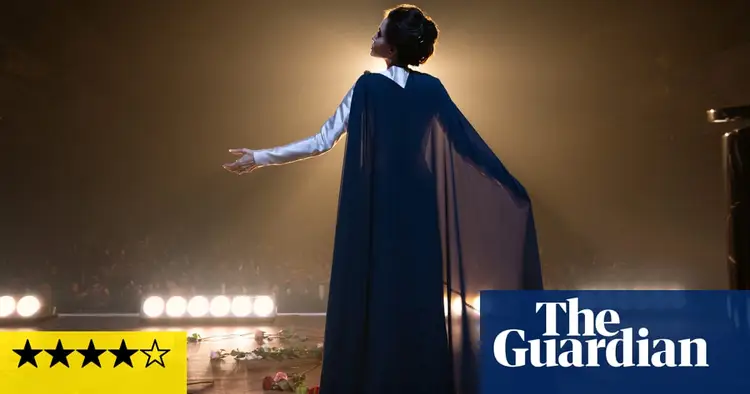Maria review – Angelina Jolie plays the diva in magnificent stroll around the cult of Callas

Conceal the ashtrays that are too full and relocate that annoying grand piano – Maria Callas, the famous opera singer, is giving a final TV interview. She is walking back and forth in her Paris apartment, taking care of her dogs and feeling the effects of the drugs she took. The journalist who is visiting her is called Mandrax, named after her preferred medication. He sits down and tests the microphone. To start off the interview, he states, "I want to explore your life with you."
Callas went from a poor area controlled by Nazis in Athens to performing in famous venues across Europe and the United States. She had a passionate relationship with Aristotle Onassis and worked with famous filmmakers like Pasolini and Zeffirelli. But in Pablo Larraín’s lavish movie Maria, the focus is on the final days of the opera singer. Angelina Jolie portrays Callas as a dignified and respected figure, retired for four years and considered a legend. She demands her servants to find a hairdresser who doesn't talk and reserve a table at a restaurant where the staff knows who she is. She craves admiration and attention at this stage in her life.
Larraín's movie focuses on Callas, but also delves into Jolie's portrayal, similar to how Limelight showcased Chaplin and Last Tango in Paris highlighted Brando. The Chilean filmmaker presents the 49-year-old actress, once a highly sought-after star, as a work of art to be admired or a priceless sculpture to be admired. Many will likely discuss how Jolie dedicated months to training for singing in the film, with her voice mixed with Callas'. However, this is primarily a symbolic gesture, an emblematic casting choice. She was chosen for her status as a well-known figure just as much as her performance ability.
Maria elegantly guides us through the glamorous life of the diva, much like a poised server carrying a tray of delicious food. The film takes us on a journey that includes visits with Onassis (played by Haluk Bilginer) and a coffee date with her resilient older sister (portrayed beautifully by Valeria Golino). Throughout the tour, the focus remains on the star as she moves through her apartment or strolls through the Jardin du Luxembourg. One of the highlights of Maria is its nostalgic depiction of 1970s Paris, a city filled with charming bistros and stylish bow-ties, seemingly untouched by turbulent student protests or the avant-garde filmmaking movement.
Many famous operas often focus on tragedy, sadness, and death so heavily that for those who don't believe in them, they can seem exaggerated or insincere. This is the case with Maria, a new opera that emphasizes even the smallest issues and always tries to make them deeply emotional. Written carefully by Steven Knight, Maria is the third part of Larraín’s series about wealthy and troubled women, following Jackie in 2016 and Spencer in 2021. However, while Spencer approached its subject matter with a sense of humor, Maria feels more forced and self-absorbed, placing too much importance on the idea of a great artist. In one scene, Callas, the main character, is late for a rehearsal, but her pianist reassures her that as Maria Callas, she can never be late – everyone else is simply early.
If all operas have the potential to fail, then the successful ones embrace the risk, captivating us with their emotional intensity and drawing us into the story. This is certainly the case with the impressive Maria, a film that is both valuable and difficult to handle, much like a large grand piano. At first, I thought it was just a superficial and exaggerated distraction, likely to be forgotten as a quirky piece of entertainment. However, it gradually captivated me and by the end, I found myself eagerly wanting more.











































